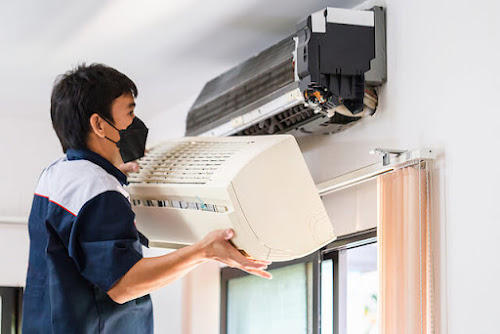How Often Should You Replace Your Air Conditioning Filter?
Importance of Air Conditioning Filters
Air conditioning filters play a vital role in trapping dust,
pollen, pet dander, mold spores, and other airborne particles. They prevent
these contaminants from circulating in your home, ensuring cleaner and
healthier indoor air. Additionally, filters help maintain the efficiency of
your AC system by preventing the buildup of debris on the evaporator coil and
other components, which can impede airflow and reduce cooling efficiency.
Signs That Your Air
Conditioning Filter Needs Replacement
It's crucial to recognize the signs that indicate your air
conditioning filter requires replacement. Some common indicators include
reduced airflow, poor air quality, increased energy consumption, and visible
dirt or debris on the filter. If you notice any of these signs, it's time to
replace your filter to maintain optimal performance and efficiency or call to air conditioning service in Melbourne.
Factors Affecting
Filter Lifespan
Several factors can influence how long an air conditioning
filter lasts before it needs replacement. These factors include the type and
quality of the filter, the level of pollutants in the air, the frequency of
system usage, and the presence of pets or smokers in the household. It's
important to consider these factors to determine the appropriate replacement
frequency for your specific situation.
Recommended Frequency
of Filter Replacement
While the exact frequency of filter replacement can vary
based on the factors mentioned earlier, a general guideline is to replace your
air conditioning filter every 30 to 90 days. However, it's advisable to check
the manufacturer's recommendations for your specific AC model. Homes with pets
or individuals with allergies may require more frequent filter changes to
maintain optimal air quality.
Steps to Replace an
Air Conditioning Filter
Replacing an air conditioning filter is a straightforward
process that can be done by most homeowners. Follow these steps to ensure a
proper filter replacement:
Turn off the AC system and locate the filter compartment.
Remove the cover or access panel to reveal the filter.
Take note of the filter's size and type.
Carefully remove the old filter and dispose of it.
Insert the new filter, ensuring it fits snugly and the
airflow direction is correct.
Replace the cover or access panel.
Turn on the AC system and monitor for proper airflow.
Benefits of Regular
Filter Replacement
Regular filter replacement provides several benefits for
both your health and your AC system's efficiency. By ensuring cleaner indoor
air, you can reduce allergies, respiratory issues, and the spread of
contaminants. Moreover, a clean filter allows for better airflow, which
improves cooling efficiency and reduces energy consumption, ultimately saving
you money on utility bills. Additionally, regular filter replacement extends
the lifespan of your AC system by reducing strain on the components and
minimizing the risk of breakdowns.
Types of Air
Conditioning Filters
There are various types of air conditioning filters
available in the market. The most common ones include:
Fiberglass Filters:
These filters are inexpensive but offer limited filtration capabilities and
need to be replaced more frequently.
Pleated Filters:
Pleated filters have a larger surface area, allowing for better filtration and
longer lifespan compared to fiberglass filters.
High-Efficiency
Particulate Air (HEPA) Filters: HEPA filters provide superior filtration by
capturing even smaller particles, making them ideal for individuals with
allergies or asthma.
Washable Filters:
Washable filters can be reused after cleaning, reducing waste and long-term
costs. However, they may not be as effective as disposable filters.
Electrostatic
Filters: Electrostatic filters use an electric charge to attract and trap
particles, offering efficient filtration and long-lasting performance.
When selecting an air conditioning filter, consider your
specific needs, budget, and the recommendations of your HVAC system
manufacturer.
Tips for Maintaining
Air Conditioning Filters
To optimize the lifespan and performance of your air
conditioning filter, follow these maintenance tips:
Check the filter
regularly: Inspect your filter every month to assess its cleanliness and
determine if it needs replacement.
Clean or replace as
needed: If using a washable filter, clean it according to the
manufacturer's instructions. For disposable filters, replace them promptly when
they are dirty or clogged.
Keep the surrounding
area clean: Minimize dust and debris near the AC unit to prevent excess
particles from entering the system and clogging the filter.
Schedule professional
maintenance: Regular HVAC system maintenance by a professional technician
will ensure all components, including the filter, are functioning optimally.
Common Mistakes to
Avoid
Avoid these common mistakes when it comes to air
conditioning filter replacement:
Neglecting filter
maintenance: Ignoring filter replacement or cleaning can lead to decreased
system efficiency, poor indoor air quality, and potential damage to the AC
unit.
Using the wrong
filter size: Always ensure you purchase the correct filter size for your AC
system. A filter that doesn't fit properly may allow unfiltered air to bypass
the filter, reducing its effectiveness.
Not following
manufacturer recommendations: Manufacturers often provide guidelines on
filter replacement frequency and specific filter types suitable for their
systems. It's important to adhere to these recommendations to maintain optimal
performance.
Forgetting to turn
off the system: Before replacing the filter, ensure the AC system is turned
off to avoid potential injuries or damage to the unit.
Overlooking
professional assistance: If you're unsure about the type of filter or how
to replace it, don't hesitate to seek professional help. HVAC technicians can
provide guidance and ensure proper installation.
Frequently Asked
Questions (FAQs)
Q: How can I
determine the right filter size for my AC system?
A: The filter size is usually printed on the existing
filter. If not, consult your HVAC system's manual or contact the manufacturer
for guidance.
Q: Can I clean and
reuse disposable filters?
A: Disposable filters are designed for one-time use.
Cleaning them may not effectively remove all contaminants, compromising their
performance.

Comments
Post a Comment